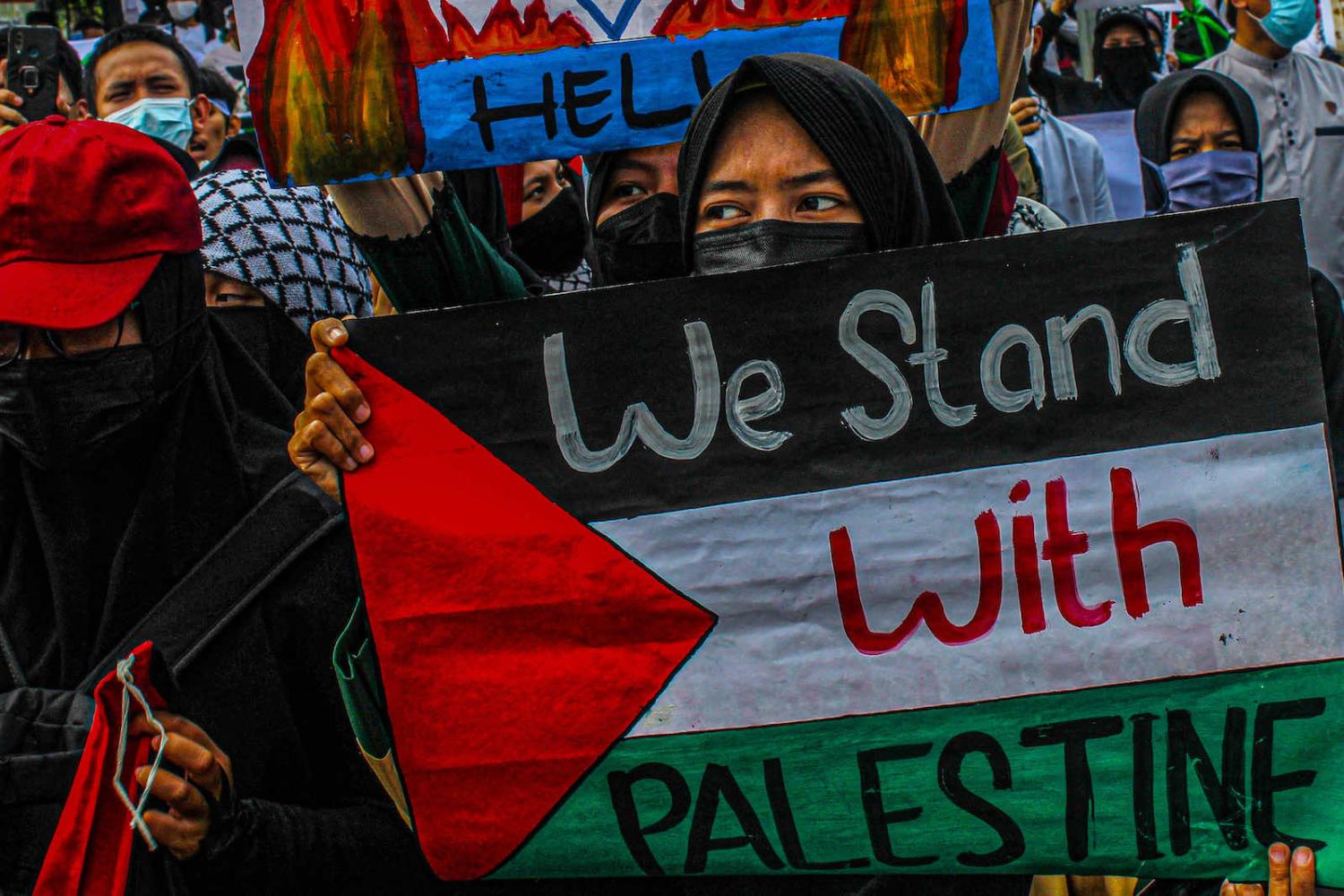Indonesia’s public debate over the issue of Palestinian rights was reawakened by the latest violence, which claimed at least 243 lives in Gaza and 12 in Israel before an eventual ceasefire. Social media was especially animated by vehement arguments as most Indonesians – 86.7% of whom identify as Muslim – supported Palestinians.
On 15 May, President Joko Widodo, better known as Jokowi, weighed into the renewed debate by tweeting Indonesia’s strong condemnation of Israel’s attacks. His foreign minister, Retno Marsudi, echoed the sentiment, declaring: “The Palestinian people deserve justice. And I emphasise that Indonesia will continue to support the Palestinian struggle.”
Indonesia strongly condemns Israeli’s attacks which has resulted in the loss of lives of hundreds, including women and children. Israel aggression must be put to a stop.
— Joko Widodo (@jokowi) May 15, 2021
The current administration’s rhetoric is consistent with Jokowi’s campaign pledge when he first ran for president in 2014 to support the Palestinian cause. But he is by no means alone in this. His political opponents also pay lip service to the idea of an independent Palestine because it is a stance which has broad appeal. Israel is not popular in Indonesia. A 2017 BBC World Service poll found 64% of Indonesians expressed negative attitudes towards Israel, and only 9% viewed the country positively.
In a show of solidarity with the Palestinians, Jakarta’s governor Anies Baswedan, considered to be Jokowi’s political rival and an aspiring presidential candidate backed by Islamic parties, ordered the capital’s main roads be lit up with the colours of the Palestinian flag.
Warna bendera Palestina menyala di berbagai fasilitas publik Jakarta sejak Sabtu lalu.
— Anies Baswedan (@aniesbaswedan) May 22, 2021
Ini merupakan bentuk dukungan dari warga Jakarta, solidaritas kemanusiaan untuk saudara-saudara kita rakyat Palestina di Jalur Gaza.https://t.co/4E0OmVSGQm pic.twitter.com/nwPeMJQDTZ
The Palestinian cause has long been a cornerstone of Indonesian foreign policy. Indonesia’s first president, Sukarno, refused to establish formal diplomatic relations with Israel and in 1953 vetoed Israel’s participation in the Asia-Africa Conference, arguing that it was acting like a colonial power by denying Palestine independence. Later, in 1962, when Jakarta hosted the Asian Games, Sukarno withheld visas from competing Israeli athletes.
But Israel does have its supporters in Indonesia, most notably among minority groups, such as Christians. Before the Covid-19 pandemic, an estimated 30,000 Indonesian Christians per year would visit Israel on a religious pilgrimage. Support for Israel is especially strong in Indonesia’s Protestant evangelical community.
Consequently, the Palestinian issue has morphed in Indonesian politics. Having long been a concern about colonialism, today the issue has been co-opted into a domestic battleground about identity politics, with support for Palestine a vocal part of political Islam in the country, versus complaints about overbearing religiosity.
AM Hendropriyono, the former chief of Indonesia’s intelligence agency (BIN) and an ally of Jokowi, aroused controversy when he claimed that the Israeli-Palestinian conflict was “no concern of Indonesia” and that Indonesians should “mind our own problems, especially when our nation is threatened by those supporting the establishment of a caliphate”.
But prominent Islamic parties have sought to capitalise on the Palestinian issue, much as was also the case when a trade deal with Australia was held up in 2018 over objections that Canberra might follow the Trump administration in recognising Jerusalem as Israel’s capital. In the latest instance, Hidayat Nur Wahid, a leading figure from the Islamic Prosperous Justice Party (PKS), alleged treachery by “Indonesian Zionists”, and while refusing to name names, it appeared to be a clear allusion to pro-Israeli Christians.
Mostly the Indonesian government’s concern about the Palestinian issue is confined to managing the fallout at home.
Fearing unrest and discontent among the Muslims, the government has sided with the majority, even at the expense of civil liberties.
A 23-year-old TikTok user from West Nusa Tenggara was recently arrested under Indonesia’s unpopular Electronic Information and Transactions law after posting a video saying “let the Palestinian pigs be slaughtered”. (He later claimed he had meant to say “Israeli pigs” and “got the names mixed up”.) In a similar case, a teenager from Bengkulu drew ire online when she called the Palestinians “pigs” in a TikTok video. In lieu of prosecution, the teenager was forced to issue a public apology and then expelled from her school. She claimed that she had only wanted to create a popular video and had not meant any harm.
Mostly the Indonesian government’s concern about the Palestinian issue is confined to managing the fallout at home. There is very little prospect of Indonesia having a meaningful contribution to finding a lasting resolution for the Israeli-Palestinian conflict.
Indonesia’s Foreign Ministry claims it has pursued diplomatic efforts through multilateral organisations, such as the United Nations and the Organisation of Islamic Cooperation, to put pressure on Israel. After Indonesia won a non-permanent seat on the UN Security Council for 2019–20, the government vowed to “pay special attention” to the Palestinian issue. But the staid deadlock resulting from power politics ensured not much came of that.
Indonesia has also made humanitarian contributions to the Palestinians. In 2018, Indonesia pledged US$7 million (A$9.4 million) across two years in aid to Palestine through the United Nations Relief and Works Agency for Palestine Refugees in the Near East (UNRWA), almost $3 million of which had been donated by public subscriptions. But the sum appeared paltry, given UNRWA has an annual budget of more than US$1 billion.
While Indonesia’s status as a middle power means that it cannot realistically hope to effect real strides in resolving the Israeli-Palestinian conflict, its politicians continue to use the issue conveniently to score points with the Muslim majority.

